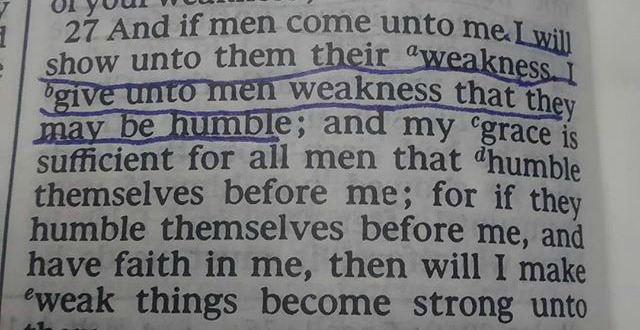Question
Gramps,
Ether 12:27 says “my grace is sufficient for all men that humble themselves before me”. This makes it sound like grace is limited. I thought the grace of God can overcome all things. Why is it only “sufficient”? And only for those who humble themselves?
Tomas
Answer
Dear Tomas,
First, let’s take another look at the scripture you mentioned: Ether 12:27: “And if men come unto me I will show unto them their weakness. I give unto men weakness that they may be humble; and my grace is sufficient for all men that humble themselves before me; for if they humble themselves before me, and have faith in me, then will I make weak things become strong unto them.”
The Lord says His grace is sufficient, but what does sufficient mean? Because language evolves over time, when I want to be clear about the meaning of words from the scriptures, I use the Webster 1828 Dictionary (it’s online). In this case it says sufficient means:
“Enough; equal to the end proposed; adequate to wants; competent; as provision sufficient for the family; water sufficient for the voyage; an armysufficient to defend the country. My grace is sufficient for thee. 2 Corinthians 12:9.”
To me this means that His grace is enough, equal, not too much—nothing is wasted, but there is enough for all.
Grace is something that is widely misunderstood in the church. If you would like to learn more about it, I recommend two great talks. The first is: His Grace is Sufficient by Brad Wilcox.
One of my favorite parts of this talk is when he says:
“I have born-again Christian friends who say to me, ‘You Mormons are trying to earn your way to heaven.’
I say, ‘No, we are not earning heaven. We are learning heaven. We are preparing for it (see D&C 78:7). We are practicing for it.’
They ask me, ‘Have you been saved by grace?’
I answer, ‘Yes. Absolutely, totally, completely, thankfully—yes!’”
Your other question about why must we humble ourselves to receive grace brings us to the other talk: The Gift of Grace by Pres. Uchtdorf
“If grace is a gift of God, why then is obedience to God’s commandments so important? Why bother with God’s commandments—or repentance, for that matter? Why not just admit we’re sinful and let God save us?
“Or, to put the question in Paul’s words, ‘Shall we continue in sin, that grace may abound?’ Paul’s answer is simple and clear: ‘God forbid.’
“Brothers and sisters, we obey the commandments of God—out of love for Him!”
Another way to understand why Christ asks us to be humble is illustrated in the popular by often misunderstood children’s book, The Giving Tree by Shel Silverstein. In the book there is a boy and a tree. The boy loves the tree. He climbs it, he uses it for a rope swing, he sits in it’s shade, and when he is older he chops it down and uses it for firewood. Then he sits on the stump that is left.
Many people look at this as a story of Christ-like love, but they miss a crucial point. At the end of the book there is a picture of the stump and Silverstein says, “And the tree was happy . . . but not really.”
The Giving Tree teaches an important message with this book, but it wasn’t Christ-like giving. The tree gave and gave and gave until it had nothing left. The boy took and took and took until there was nothing more to take.
That is not the Savior’s way.
True Christ-like love would not leave one party depleted and the other completely selfish. By asking us to give something back, i.e. humility and keeping the commandments, Christ is teaching us to become more like Him, to be less selfish, and to be willing to give of ourselves as He did.
Gramps







